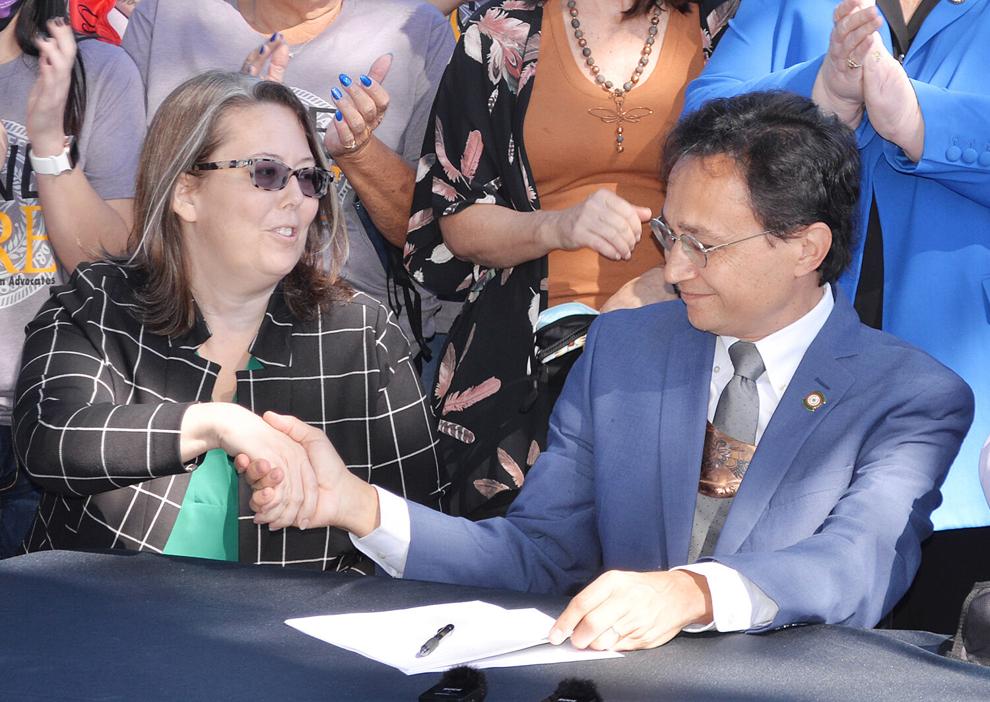
- Details
- By Chuck Hoskin Jr
Guest Opinion. On Oct. 18, President Joe Biden announced the nomination of Sara Hill to be a federal judge on the U.S. District Court for the Northern District of Oklahoma. If confirmed by the U.S. Senate to this lifetime position, she will be the first Native American woman to serve as a federal judge in Oklahoma.
Sara Hill’s nomination is exciting for Cherokee Nation and all of Indian Country, and not only because it is a historic milestone. Hill is highly qualified for this role, with degrees from Northeastern State University and the University of Tulsa, experience serving as a Special Assistant U.S. Attorney in the Northern District of Oklahoma and a nearly two-decade-long career as an attorney with Cherokee Nation, including as the Nation’s first Secretary of Natural Resources and, most recently, as Attorney General.
She has received numerous awards and recognitions throughout her career, including receiving the Cherokee Nation Statesmanship Award, being named a 50 Making a Difference honoree from The Journal Record, and being named as a Person to Watch by the Tulsa World.
As a Cherokee woman, she adds important diversity to the ranks of federal judges and will contribute much-needed expertise in the unique issues affecting Indian Country. Her experience includes leading Cherokee Nation’s legal response in the successful defense of the Indian Child Welfare Act at the U.S. Supreme Court. She represented Cherokee Nation in a lawsuit against opioid distributors, which brought millions of dollars in funding for addiction treatment back to the Cherokee Nation Reservation. She has also been integral to building out the Cherokee Nation’s justice system and navigating the evolving legal landscape following McGirt v. Oklahoma.
I am confident that she will bring to the Northern District the same high level of legal expertise, work ethic and sense of fairness that she brought to her job as Cherokee Nation’s Attorney General during some of the most challenging years in our tribe’s history.

Recognition of Ms. Hill’s legal work goes far beyond the Cherokee Nation. She is widely respected across Oklahoma and the entire country. That admiration is bipartisan, as President Biden’s nomination of Hill received glowing endorsements from Oklahoma Sens. James Lankford and Markwayne Mullin. The nomination was also endorsed by the National Congress of American Indians, the Native American Rights Fund and the Inter-Tribal Council representing the Cherokee, Chickasaw, Choctaw, Muscogee and Seminole Nations.
Deputy Chief Bryan Warner and I are extremely proud of former Attorney General Sara Hill, and we look forward to seeing her confirmed by the U.S. Senate. In the bigger picture, I am excited to see the increasing number of Natives serving as judges and other key roles in the federal court system.
The United States and tribal nations have a unique legal and constitutional relationship, and for two centuries, Cherokees have been at the forefront of working to correctly apply federal Indian law. When Sara Hill takes the bench as a federal judge, she will ably carry on that tradition.
Chuck Hoskin, Jr. is the principal chief of the Cherokee Nation.
More Stories Like This
Colorado cannot heal until it confronts Sand Creek honestlyNative American Mothers Deserve to Live
Technology Rooted in Tradition is Strengthening Cherokee Nation
The Lumbee Tribe of North Carolina: #575
Tribes Do Not Need a Greenlight to Build Renewable Energy
Help us defend tribal sovereignty.
At Native News Online, our mission is rooted in telling the stories that strengthen sovereignty and uplift Indigenous voices — not just at year’s end, but every single day.
Because of your generosity last year, we were able to keep our reporters on the ground in tribal communities, at national gatherings and in the halls of Congress — covering the issues that matter most to Indian Country: sovereignty, culture, education, health and economic opportunity.
That support sustained us through a tough year in 2025. Now, as we look to the year ahead, we need your help right now to ensure warrior journalism remains strong — reporting that defends tribal sovereignty, amplifies Native truth, and holds power accountable.
 The stakes couldn't be higher. Your support keeps Native voices heard, Native stories told and Native sovereignty defended.
The stakes couldn't be higher. Your support keeps Native voices heard, Native stories told and Native sovereignty defended.
Stand with Warrior Journalism today.
Levi Rickert (Potawatomi), Editor & Publisher

